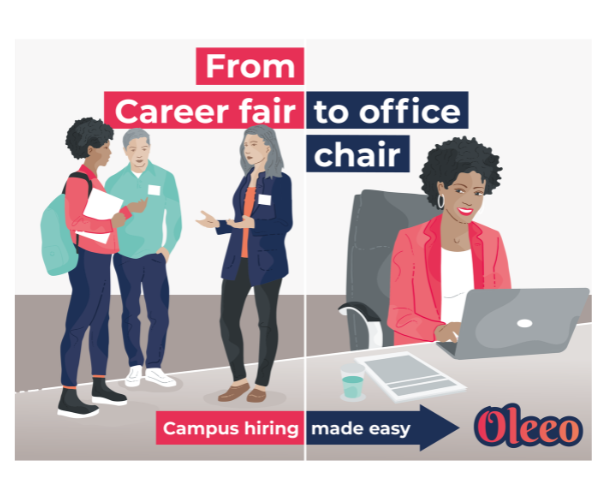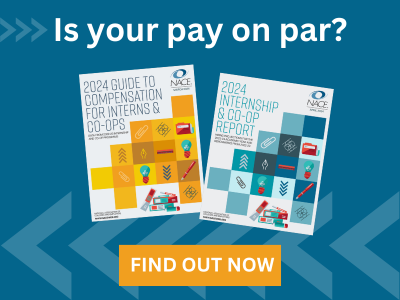by the Principles for Ethical Professional Practice Committee
Scenario: A large employer that has had a longstanding relationship with a university career services office has decided to participate in the office’s new partnership/sponsorship program as a silver sponsor. The silver sponsor package includes benefits such as choice of table placement at fairs, being marketed as a fair sponsor, first right of refusal for campus interviewing dates, company logo on the main career services webpage, and an individual meeting with a member of the career services employer relations team to further discuss the company’s recruiting strategy and timing.
During the meeting with the employer relations team, the company representative indicates the company is seeking to diversify its talent pool for its internship program, which serves as a feeder to the company’s entry-level job opportunities. The representative explains that the company defines “diverse” as racial/ethnic minorities and students with disabilities. The company is in a hurry to get started, and the representative requests the following be accomplished within the next couple of weeks:
- First, the company representative asks to be connected with faculty who can refer their best diverse students to the company.
- The representative also asks to set up an event/information session targeted only to diverse students.
- Finally, the representative asks for a list of diverse juniors with public profiles and resumes so the company can message them individually through the career services office’s online career management system.
Questions: Should career services offices or other campus offices/groups provide exclusive events for specific student audiences?
How does/should a career services office balance the financial needs of the office with the needs of the employer sponsor and needs of students?
Can an employer ask for a specific type of diverse candidate? Is this an exclusionary practice?
Does the career services office coach the employer in defining diversity as broadly as possible?
How can the career services office connect the company with the faculty and campus affinity groups or offices and maintain the NACE Principles?
Do any additional NACE Principles apply?
Do any local, state, or federal laws apply?
Should the legal office of the institution be notified and weigh in with an opinion and provide guidance?
Should the career services office identify individual students for employers?
Does/should career services coach diverse students who are seeking employment or intern opportunities if or when to disclose such information about themselves?
If the opportunity was for an employer’s formal specific diversity internship program, would the consideration and answer still be the same?
Should the career services office or faculty members push out/market opportunities only to diverse candidates upon employer request?
Analysis: From the employer’s perspective, trying to reach and hire a diverse talent pool seems like a win-win-win. The employer expands its diverse hires, the career services office has a student hire, and the student has a job or internship. However, there are issues in terms of how to reach this hiring goal. Principle 3 (Ensure equitable access) and Principle 5 (Protect confidentiality) are important considerations in this matter.
The fact that an employer has provided financial support should not enable the employer to receive special considerations that do not permit equitable access to and consideration for opportunities by all students. Nor should financial support compromise the confidentiality of students’ personal information. There are methods available to reach and inform diverse students of opportunities without having to compromise the NACE Principles. Additionally, merely providing financial support should not convince an education institution to bypass its legal requirements and subject itself to potential liability.
Inclusion, not exclusion practices, are at the heart of what the NACE Principles address and advance. Keep in mind that inclusion practice not only applies to career centers but also to faculty and other campus offices such as multicultural academic or student programs and offices of accessibility, veterans affairs, and so forth.
If there is a student perception that recruiting is exclusionary, one must consider possible broader consequences, such as a potential lawsuit. In addition, the identification of individual diverse students and referral of these individuals to an employer not only violates the intent of the NACE Principles but also may be illegal. In this regard, if career centers assist employers in discriminating against certain classifications of individuals, it could be exposing the university to potential lawsuits. To avoid potential legal problems, the institution’s legal counsel and affirmative action office should be consulted.
Faculty might be contacted directly by employers and offer to help students seek employment; however, there are potential risks—both legally and ethically—with their doing so, as well. Please refer to “A Faculty Guide to Ethical and Legal Standards in Student Hiring.” Faculty may need to be informed of these guidelines. Please note that the guidelines are not exclusive to faculty: They can also be provided to others on campus who would benefit from them.
Principles That Apply:
- Principle 3. Ensure equitable access
… without stipulation or exception relative to contributions of financial support, gifts, affiliation, or in-kind services.
… in the provision of services and opportunities without discriminating on the basis of race, gender, gender identity, ethnicity, sexual orientation, religion, national origin, disability, age, economic status, or veteran status.
… by proactively addressing inclusivity and diversity.
- Principle 5. Protect confidentiality of
… all personal information related to candidates and their interviews, and their engagement with services, programs, and resources.
… student information related to professional plans.
Options for Resolution: When a career services representative speaks with the company and its representatives, it needs to be clear that the company’s opportunities should be made available for all students to apply who feel they are qualified and interested in being considered for the position.
The employer may be able to use the career services office’s career/learning management system to post a job opening and use its other functions to connect with students. For instance, some job-posting or employment products have functions to assist employers in connecting with students in a manner similar to social media-based, networking types of platforms.
In addition, connections to key faculty members can be made with the understanding that the position is open to anyone to apply. Perhaps the faculty member would announce the opportunity in class.
Connections can be made to diverse student clubs/organizations/fraternities for the employer to connect with as well as with offices on campus such as the accessibility office to help spread the word and encourage diverse students to apply.
The career services office can assist diverse students with the questions surrounding the job/internship search. However, the students’ information would be held in confidence between the counselor and the students. The career services office should not identify or refer individual students to an employer as it could expose the educational institution to potential liability.
Finally, being proactive and managing expectations will help to avoid this scenario. Familiarizing faculty and campus offices, including the development and alumni offices, with the NACE Principles for Ethical Professional Practice along with the career services office’s recruitment guidelines/policies can help to avoid the situation. Additionally, set expectations with employers individually, through the office’s web pages and marketing materials, and through employer partner meetings. If the campus has multiple career services offices, having consistent policies in how you accommodate employers’ needs will also help manage expectations.
Resources
Consult with your institution’s legal staff and Affirmative Action office to mitigate any potential risks. Other resources include:
U.S. Department of Labor Equal Employment Opportunity
A Faculty Guide to Ethical and Legal Standards in Student Hiring
Legal Issues: Diversity Recruiting
Rubric for Responding to Ethical Dilemmas
Reviewed by the 2022 Principles for Ethical Professional Practice Committee.






